Description
Description
What is Genotropin (somatropin)?
Somatropin is a form of human growth hormone. Human growth hormone is important in the body for the growth of bones and muscles.
Somatropin is used to treat growth failure in children and adults who lack natural growth hormone, and in those with chronic kidney failure, Noonan syndrome, Turner syndrome, Prader-Willi syndrome, short stature at birth with no catch-up growth, and other causes. Somatropin is also used to prevent severe weight loss in people with AIDS, or to treat short bowel syndrome.
Somatropin may also be used for purposes not listed in this medication guide.
What is the most important information I should know about Genotropin (somatropin)?
Before you receive somatropin, tell your doctor about all your past and present medical conditions, especially allergies, trauma, surgery, diabetes, cancer, breathing problems, liver or kidney disease, scoliosis, high blood pressure, pancreas disorder, underactive thyroid, or a brain tumor.
Also tell your doctor about all other medications you use, especially steroids or diabetes medications. Your dosages of these medicines may need to be changed when you start using somatropin. Do not stop using a steroid suddenly or change any of your medication doses without your doctor’s advice.
If you have Prader-Willi syndrome and are using somatropin, call your doctor promptly if you develop signs of lung or breathing problems such as shortness of breath, coughing, or new or increased snoring.
Call your doctor at once if you have sudden and severe pain in your upper stomach with nausea and vomiting, fast heartbeat, increased thirst or urination, weight loss, or vision changes and sudden, severe pain behind your eyes.
What should I discuss with my healthcare provider before using Genotropin (somatropin)?
Before you receive somatropin, tell your doctor if you have ever had an allergic reaction to a growth hormone medicine, or to drug preservatives such as benzyl alcohol, metacresol or glycerin.
You should not use this medication if you are allergic to somatropin, or if you have:
- diabetic retinopathy (a serious eye condition caused by diabetes);
- cancer; or
- Prader-Willi syndrome and are also overweight or have sleep apnea or severe respiratory (lung) problems.
You should also not use somatropin if you have a serious medical condition after having:
- open heart surgery or stomach surgery;
- trauma or other medical emergency; or
- breathing problems (such as lung failure).
To make sure you can safely take somatropin, tell your doctor if you have any of these other conditions:
- liver disease;
- kidney disease (or if you are on dialysis);
- diabetes;
- a pituitary gland disorder;
- scoliosis;
- high blood pressure (hypertension);
- a pancreas disorder (especially in children);
- a history of cancer;
- carpal tunnel syndrome;
- underactive thyroid; or
- a brain tumor or lesion.
FDA pregnancy category B. Some brands of somatropin are not expected to harm an unborn baby, including Genotropin, Omnitrope, Saizen, Serostim, and Zorbtive.
FDA pregnancy category C. It is not known whether certain other brands of somatropin will harm an unborn baby, including Humatrope, Norditropin, Nutropin, and Tev-tropin.
Tell your doctor if you are pregnant or plan to become pregnant while using this medication.
It is not known whether somatropin passes into breast milk or if it could harm a nursing baby. Do not use somatropin without telling your doctor if you are breast-feeding a baby.
How should I use Genotropin (somatropin)?
Use exactly as prescribed by your doctor. Do not use in larger or smaller amounts or for longer than recommended. Follow the directions on your prescription label.
Your dose and brand of somatropin, and how often you give it will depend on what you are being treated for. Follow the directions on your prescription label.
Somatropin is injected into a muscle or under the skin. You may be shown how to use injections at home. Do not self-inject this medicine if you do not fully understand how to give the injection and properly dispose of used needles and syringes.
Use a different place on your body each time you give the injection. Your care provider will show you the best places on your body to inject the medication. Do not inject into the same place two times in a row. Do not inject this medicine into skin or muscle that is red, sore, infected, or injured.
Do not shake the medication bottle or you may ruin the medicine. When mixing somatropin with a diluent (liquid), use a gentle swirling motion. Do not use the medication if it has changed colors or has particles in it. Call your doctor for a new prescription.
Use a disposable needle only once. Throw away used needles in a puncture-proof container (ask your pharmacist where you can get one and how to dispose of it). Keep this container out of the reach of children and pets.
To be sure this medication is helping your condition and not causing harm, your blood and growth progress will need to be tested often. Your eyes may also need to be checked. Visit your doctor regularly.
If you are being treated for short bowel syndrome, follow the diet plan created for you by your doctor or nutrition counselor to help control your condition. Somatropin is not a cure for short bowel syndrome.
If you use a form of somatropin that comes in a cartridge for use with an injection pen, use only the pen injection system provided with the somatropin brand you use.
How you store this medicine will depend on what brand you are using and what diluent you are mixing somatropin with. After mixing somatropin, you may need to use it right away or you may be able to store it for later use. Read and carefully follow the instructions provided with your medicine about proper storage of somatropin before and after it has been mixed. Ask your pharmacist if you have any questions about proper storage of your medication.
Throw away any somatropin left over after the expiration date on the label has passed.
What happens if I miss a dose?
Use the missed dose as soon as you remember. Skip the missed dose if it is almost time for your next scheduled dose. Do not use extra medicine to make up the missed dose.
Call your doctor if you miss more than 3 doses in a row.
What happens if I overdose?
Seek emergency medical attention or call the Poison Help line at 1-800-222-1222.
Overdose can cause tremors or shaking, cold sweats, increased hunger, headache, drowsiness, weakness, dizziness, fast heartbeat, and nausea. Long-term overdose may cause excessive growth.
What should I avoid while using Genotropin (somatropin)?
If you use Zorbtive to treat short bowel syndrome, avoid drinking fruit juices or soda beverages. Follow the instructions of your doctor or nutrition counselor about what types of liquids you should drink while using Zorbtive.
Avoid drinking alcohol if you have short bowel syndrome. Alcohol can irritate your stomach and could make your condition worse.
Genotropin (somatropin) side effects
If you have Prader-Willi syndrome, call your doctor promptly if you develop signs of lung or breathing problems such as shortness of breath, coughing, or new or increased snoring. Rare cases of serious breathing problems have occurred in patients with Prader-Willi syndrome who use somatropin.
Get emergency medical help if you have any of these signs of an allergic reaction: hives; difficult breathing; swelling of your face, lips, tongue, or throat.
Call your doctor at once if you have any of these serious side effects:
- severe pain in your upper stomach spreading to your back, nausea and vomiting, fast heart rate;
- increased thirst, increased urination, hunger, dry mouth, fruity breath odor, drowsiness, dry skin, blurred vision, and weight loss;
- sudden and severe pain behind your eyes, vision changes;
- swelling in your head, face, hands, or feet; or
- numbness or tingling in your wrist, hand, or fingers.
Less serious side effects may include:
- headache, feeling tired;
- redness, soreness, swelling, rash, itching, pain, or bruising where the medicine was injected;
- pain in your arms or legs, joint stiffness or pain;
- muscle pain; or
- cold symptoms such as stuffy nose, sneezing, sore throat.
What other drugs will affect Genotropin (somatropin)?
Before using somatropin, tell your doctor if you use insulin or take oral (by mouth) medicine to treat diabetes. Somatropin may affect blood sugar levels and you may need to adjust your dose of the diabetes medication. Do not change the dose of your diabetes medication without your doctor’s advice.
Tell your doctor if you use any type of steroid medicine such as cortisone, dexamethasone, methylprednisolone, prednisone, and others. Steroids can make somatropin less effective and your doses may need to be adjusted. Do not stop using a steroid suddenly. Follow your doctor’s instructions.
Tell your doctor about all other medications you use, especially cyclosporine (Gengraf, Neoral, Sandimmune), seizure medication, birth control pills, anabolic steroids, or hormone replacement medications for men or women.
This list is not complete and other drugs may interact with somatropin. Tell your doctor about all medications you use. This includes prescription, over-the-counter, vitamin, and herbal products. Do not start a new medication without telling your doctor.
Where can I get more information?
Your pharmacist has additional information about genotropin written for health professionals that you may read.

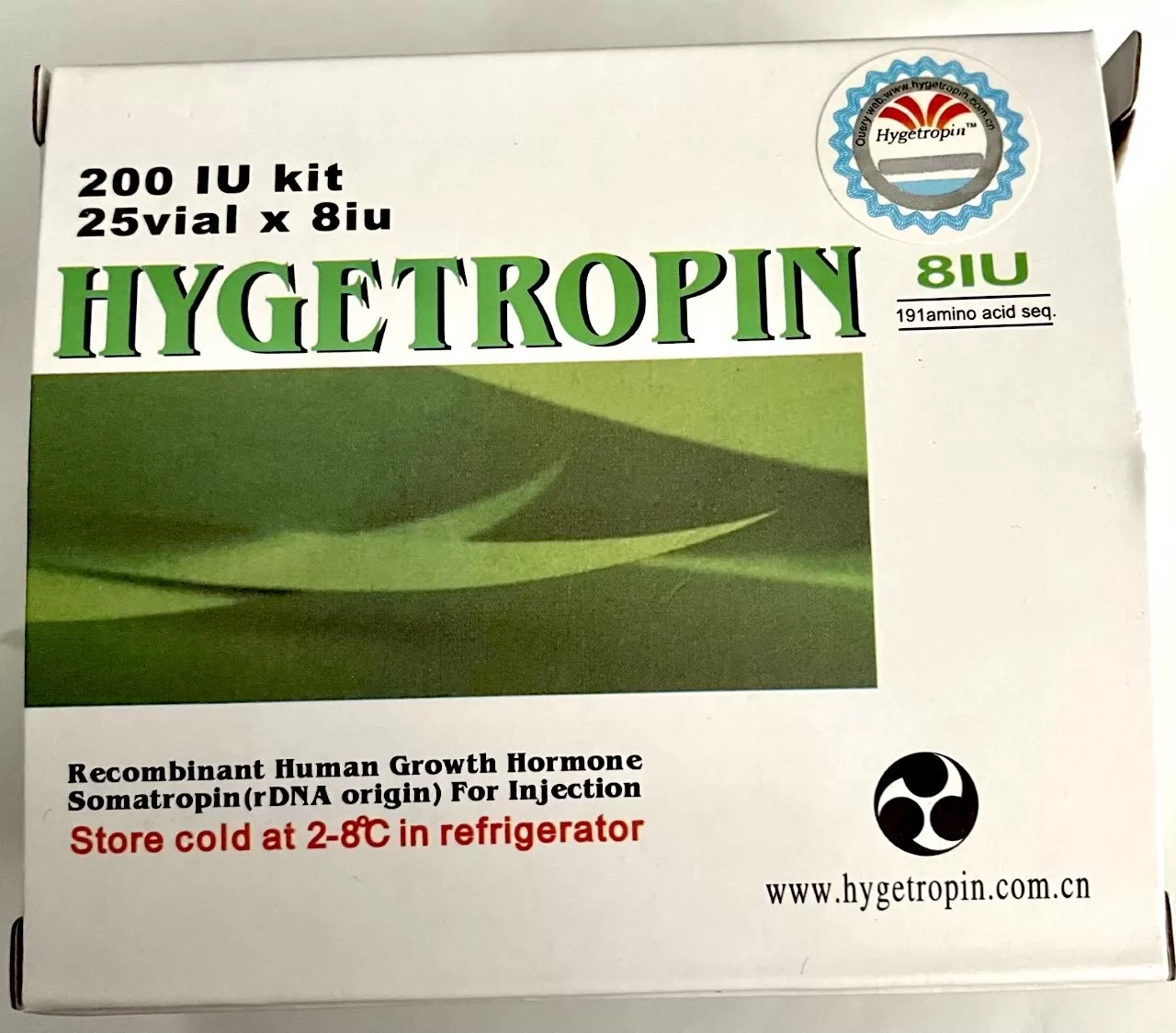
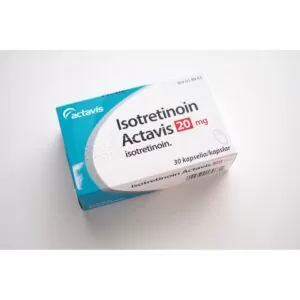
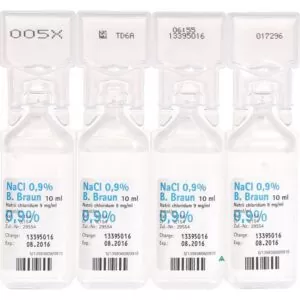

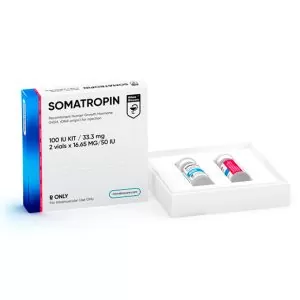

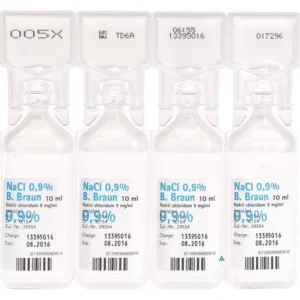
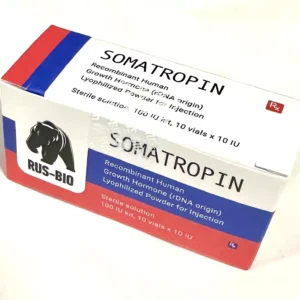


Reviews
There are no reviews yet.